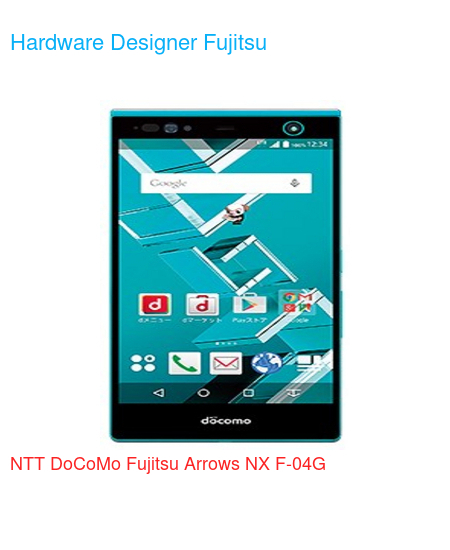| Brand | NTT DoCoMo |
| Model | Fujitsu Arrows NX F-04G |
| Released | 2015 May 28 |
| Hardware Designer | Fujitsu |
| Manufacturer | Fujitsu |
| Device Category | Smartphone |
| Width | 70 mm |
| Height | 146 mm |
| Depth | 10.5 mm |
| Dimensions | 2.76×5.75×0.41 inches |
| Mass | 155 g |
| Platform | Android |
| Operating System | Google Android 5.0 (Lollipop) |
| CPU Clock | 2000 MHz |
| CPU | Qualcomm Snapdragon 810 MSM8994 v2.0, 2015, 64 bit, octa-core, 4096 Kbyte L2, 20 nm, Qualcomm Adreno 430 GPU |
| RAM Type | LPDDR3 SDRAM |
| RAM Capacity (converted) | 3 GiB RAM |
| Non-volatile Memory Interface | Yes |
| Non-volatile Memory Capacity (converted) | 32 GB ROM |
| Display Diagonal | 132 mm |
| Resolution | 1440×2560 |
| Horizontal Full Bezel Width | 5.29 mm |
| Display Area Utilization | 72.9% |
| Pixel Density | 565 PPI |
| Display Type | Color IPS TFT LCD display |
| Number of Display Scales | 16.8M |
| Scratch Resistant Screen | Yes |
| Graphical Controller | Qualcomm Adreno 430 |
| Dedicated Graphics Memory | 1.5 MiB |
| A/V Out | MHL |
| Microphone(s) | Yes |
| Loudspeaker(s): | mono |
| Audio Output: | 3.5mm |
| Supported Cellular Bands | GSM850 , GSM900 , GSM1800 , GSM1900 , UMTS2100 (B1) , UMTS800 (B6) , UMTS800 (B19) , LTE2100 (B1) , LTE1800 (B3) , LTE700 (B17) , LTE800 (B19) , LTE1500 (B21) bands |
| Supported Cellular Data Links | GPRS , UMTS , HSUPA , HSUPA 5.8 , HSDPA , HSDPA 14.4 , LTE , LTE 225/50 data links |
| SIM Card Slot | Nano-SIM (4FF) |
| Complementary Phone Services | Voice transmission , Voice speaker , Vibrate , Speakerphone , VoLTE |
| Sec. Supported Cellular Networks: | No |
| Touchscreen Type | Capacitive multi-touch screen |
| Expansion Interfaces | TransFlash , microSD , microSDHC , microSDXC |
| USB | USB 2.0 |
| USB Services | USB charging , USB Host , USB OTG 1.3 , USB PD |
| USB Connector | USB Micro-AB |
| Bluetooth | Bluetooth 4.1 |
| Wireless LAN | 802.11a , 802.11b , 802.11g , 802.11n , 802.11ac |
| Wireless Services | Miracast , Wi-Fi Direct |
| NFC | FeliCa |
| IR | Yes |
| FM Radio Receiver | FM radio (88-108 MHz) with RDS |
| Digital Media Broadcast | ISDB-T 1-Seg receiver |
| Complementary Satellite Services | Simultaneous GPS , A-GPS , Geotagging , QuickGPS |
| Supported GLONASS protocol(s) | L1OF |
| Camera Placement | Rear |
| Camera Image Sensor | CMOS |
| Number of effective pixels | 20.7 MP camera |
| Zoom | 1.0 x optical zoom |
| Focus | CD AF |
| Video Recording | 3840×2160 pixel |
| Flash | single LED |
| Camera Extra Functions | EIS , HDR photo , HDR video , Touch focus , Macro mode , Panorama Photo , Face detection |
| Aux. Camera Image Sensor | No |
| Aux. 2 Camera Image Sensor | No |
| Aux. 3 Camera Image Sensor | No |
| Aux. 4 Camera Image Sensor | No |
| Secondary Camera Placement | Front |
| Secondary Camera Sensor | CMOS |
| Secondary Camera Number of pixels | 2.1 MP sec. cam |
| Secondary Video Recording | 1920×1080 pixel |
| Sec. Aux. Cam. Image Sensor | No |
| Built-in accelerometer | Yes |
| Built-in gyroscope | Yes |
| Additional sensors | Iris scanner , L sensor , P sensor |
| Protection from solid materials | 6 Totally protected from dust |
| Protection from liquids | 8 Protected against immersion beyond 1m of depth |
| Battery | Li-ion polymer (LiPo) |
| Nominal Battery Capacity | 3120 mAh battery |
| Market Countries | Japan , South Korea |
| Market Regions | Asia |
| Mobile Operator | NTT DoCoMo |
| Added | 2024-06-26 |
Specifications data description of this 📱NTT DoCoMo Fujitsu Arrows NX F-04G📱
Title: The Ultimate Specification Guide for Your Devices 🌐📅🏋️🌈🤖🛠️🚀🔧💪🖥️🎮🧠🗂️📷🎥🔈📡📶💡🔋🔌
Introduction:
Welcome to our comprehensive devices specification guide, where we delve deep into the fascinating world of technology, breaking down all the essential components that make your devices tick. Whether you’re in the market for a new smartphone, laptop, or tablet, this blog post is the ultimate one-stop-shop for everything you need to know. Prepare to be amazed and intrigued as we embark on this digital odyssey! 🌐📅🏋️🌈🤖🛠️🚀🔧💪🖥️🎮🧠🗂️📷🎥🔈📡📶💡🔋🔌
Lineup:
In this guide, we will explore a wide range of devices, including smartphones, tablets, smartwatches, and laptops from various manufacturers. We’ll cover the latest releases from industry powerhouses such as Apple, Samsung, Google, Huawei, and many more. So, buckle up and get ready to embark on a thrilling journey through the ever-evolving landscape of devices! 🌐📅🏋️🌈🤖🛠️🚀🔧💪🖥️🎮🧠🗂️📷🎥🔈📡📶💡🔋🔌
Design:
Design is one of the most crucial factors for any device. Not only is it a matter of aesthetics, but the way a device is crafted can also greatly impact usability, functionality, and performance. In this guide, we will discuss the design elements that make each device stand out, such as materials, dimensions, weight, build quality, color options, and display technology. 🌐📅🏋️🌈🤖🛠️🚀🔧💪🖥️🎮🧠🗂️📷🎥🔈📡📶💡🔋🔌
Specifications:
Now, it’s time to dive deep into the nitty-gritty of devices, the specifications. We will explore the different components that make your devices function seamlessly, such as:
🌐 NETWORK: Learn about the various network capabilities of devices, such as 4G, 5G, Wi-Fi, and Bluetooth.
📅 LAUNCH: Discover the launch dates of the latest devices and how they stack up against their competition.
🏋️ BODY: Get the low-down on materials, measurements, and display technology.
🌈 DISPLAY: Delve into display technology, such as OLED, AMOLED, and LCD, and what they mean for your visual experience.
🤖 OS: Discover the different operating systems and their unique features.
🛠️ CHIPSET: Find out about the latest chipsets and what they offer in terms of performance and efficiency.
🚀 CPU: Get to grips with CPU architecture and how it impacts device speed.
🔧 GPU: Explore GPU capabilities and their effects on gaming and visual performance.
🧠 MEMORY: Learn about RAM and how it influences multitasking and overall device performance.
🗂️ STORAGE: Discover the difference between internal and external storage options.
📷 CAMERA: Delve into camera technology, such as the different sensors, lenses, and features.
🎥 VIDEO RECORDING: Discover the video recording capabilities of your devices.
🔈 SOUND: Learn about sound technology and audio quality.
📡 CONNECTIVITY: Get acquainted with the communication options available on your devices.
📶 BATTERY: Discover the latest battery technology and how it impacts battery life.
💡 FEATURES: Uncover the various unique features that make each device stand out.
🔋 CHARGING: Discover the charging capabilities and technologies that impact charging speed and battery longevity.
🔌 PORTS: Learn about the various ports available and their functions.
Conclusion:
As you’ve seen, there are myriad elements that come together to create the devices we know and love. Whether you’re a seasoned tech aficionado or new to the world of technology, it’s essential to understand these components to make the most informed decisions when purchasing devices.
We hope this comprehensive guide has given you the knowledge you need to take your tech game to the next level. And don’t forget, we want to hear from you! Drop a comment below and share your thoughts on this guide and your own experiences with devices. 🌐📅🏋️🌈🤖🛠️🚀🔧💪🖥️🎮🧠🗂️📷🎥🔈📡📶💡🔋🔌














